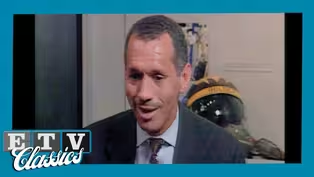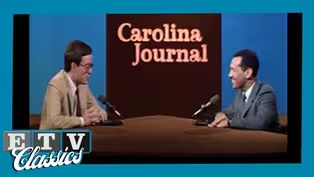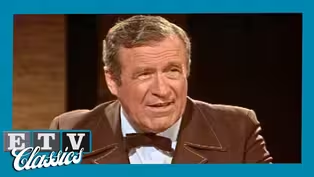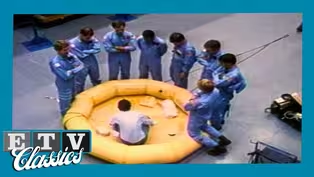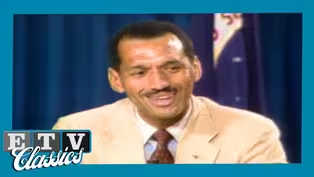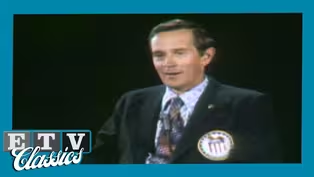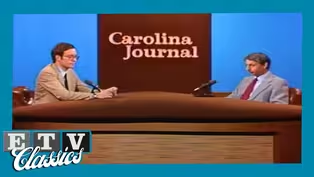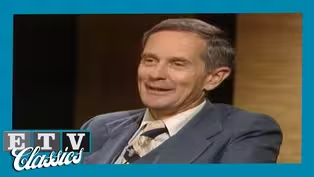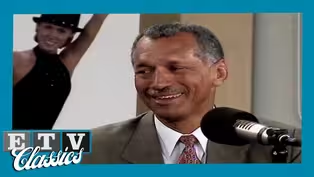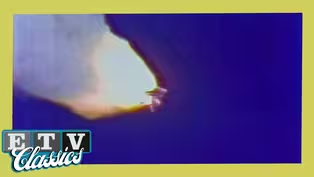ETV Classics
South Carolina in the Space Age | Palmetto Specials (1991)
Season 14 Episode 11 | 18m 50sVideo has Closed Captions
A look back at the experiences of Charles F. Bolden Jr. and his rise to becoming an astronaut.
This SCETV program provides a look back at the experiences of Charles F. Bolden Jr, and his rise to becoming 1 of 6 South Carolinians to become astronauts at the time. He prompts viewers to take on their dreams and appreciate life and the people in it.
Problems playing video? | Closed Captioning Feedback
Problems playing video? | Closed Captioning Feedback
ETV Classics is a local public television program presented by SCETV
Support for this program is provided by The ETV Endowment of South Carolina.
ETV Classics
South Carolina in the Space Age | Palmetto Specials (1991)
Season 14 Episode 11 | 18m 50sVideo has Closed Captions
This SCETV program provides a look back at the experiences of Charles F. Bolden Jr, and his rise to becoming 1 of 6 South Carolinians to become astronauts at the time. He prompts viewers to take on their dreams and appreciate life and the people in it.
Problems playing video? | Closed Captioning Feedback
How to Watch ETV Classics
ETV Classics is available to stream on pbs.org and the free PBS App, available on iPhone, Apple TV, Android TV, Android smartphones, Amazon Fire TV, Amazon Fire Tablet, Roku, Samsung Smart TV, and Vizio.
Providing Support for PBS.org
Learn Moreabout PBS online sponsorshipMore from This Collection
South Carolina is home to astronauts Charles Duke, Ronald McNair, and Charles Bolden Jr.
Conversations with Scientists and Astronauts: Charles Bolden, Part 1 (1998)
Video has Closed Captions
Learn alongside students as they ask astronaut Charles F. Bolden Jr. questions. (19m 1s)
Colonel Charles Bolden: Aftermath of the Challenger | Carolina Journal (1986)
Video has Closed Captions
Colonel Charles Bolden offers a candid reflection on the space shuttle 'Challenger' disaster. (27m 50s)
Space Shuttle: Delays & Possibilities for the Future with Dr. LeConte Cathey | Open Line (1981)
Video has Closed Captions
Dr. LeConte Cathey discusses satellites, the space shuttle, and maintaining technology for space. (28m 47s)
South Carolina Astronauts | Venture (1986)
Video has Closed Captions
Learn more about the firsthand experiences of astronauts Charles Duke and Charles Bolden Jr. (6m 51s)
Profile: Charles F. Bolden Jr. | Carolina Journal (1986)
Video has Closed Captions
A special look at the extraordinary legacy and life journey of astronaut Charles Bolden. (58m 59s)
Kennedy Space Center: Apollo 16 Launch | Nine30 (1972)
Video has Closed Captions
An in-depth look at the launch of Apollo 16 as well as the legacy of the Kennedy Space Center. (30m 6s)
Journalist in Space | Carolina Journal (1986)
Video has Closed Captions
Host Tom Fowler interviews Jack Bass, a member of NASA’s Journalist-In Space project. (27m 52s)
General Charles Duke | Open Line (1983)
Video has Closed Captions
Host Tom Fowler interviews Apollo 16 astronaut Charles Duke about his career with NASA. (28m 50s)
Brigadier General Charles Bolden Jr. | Xpress (2003)
Video has Closed Captions
An interview with former NASA administrator and astronaut Charles Bolden. (26m 45s)
Shuttle Challenger Accident | Carolina Journal (1986)
Video has Closed Captions
Host Tom Fowler brings the breaking news about the Space Shuttle Challenger to South Carolina. (29m 38s)
Providing Support for PBS.org
Learn Moreabout PBS online sponsorship♪ South Carolina ♪ has a history ♪ ♪ all its own, ♪ ♪ from the ♪ silver studded oceans.
♪ ♪ to a restful ♪ mountain home.
♪ ♪ Future's bright and certain, ♪ ♪ but the past ♪ is close at hand ♪ ♪ And together ♪ we can face tomorrow, ♪ ♪ knowing where we've been.
♪ ♪ ♪ >> If you've ever visited the South Carolina State Museum in Columbia, you've probably spent some time at this space science exhibit featuring South Carolinians who have been or are currently a part of the NASA astronaut program.
Charles Bolden, from here in Columbia, is one of those astronauts and is the subject of today's edition of the Palmetto Special.
Announcer> What's it take to go to the top?
Ask a Marine.
Charles Bolden> Practice, practice, practice and the discipline and skills I learned as a marine officer are helping me master the skills I need to be an astronaut.
If you're looking for a chance to test yourself, to see just how far you can go, look into the United States Marine Corps.
It could be your ticket to the stars.
Narrator> Columbia's Charles Bolden is one of six South Carolinians who've earned their tickets to the stars by becoming astronauts.
From Lancaster, Charles Duke became the first South Carolina astronaut in 1966 and walked on the moon as command pilot of Apollo 16.
Gathering moon rocks and riding the moon rover.
From Lake City, Dr.
Ron McNair became the country's first African-American astronaut.
Dr.
McNair was tragically killed on board the Shuttle Challenger when it exploded during takeoff in 1986.
Other South Carolinian astronauts have been Steve Thorne from Anderson, who died in a private plane accident while in training.
And from Greenville, John Casper was selected by NASA in 1984, the same year that Holly Hill native, Frank Culbertson was also chosen.
Charles Bolden has very vivid memories of being a kid in South Carolina's capital city, Columbia.
Charles> I grew up in what was then called the Waverly section of Columbia, where eventually my elementary school, my junior high school and my high school were all pretty close.
Starting from Bethlehem Center Kindergarten, going through Carver Elementary School, and then to W.A.
Perry Junior High School, where I had the first opportunity to to be taught by a parent.
My mother was the librarian there.
The life in my home as one...of two boys.
I'm four years older than my younger brother was relatively, I guess, what you would call traditional back in those times.
I had both mom and dad at home.
They were both school teachers.
They were both, very religious people.
So I grew up in the church.
They had always taught me the value of respecting other person's rights and opinions.
They had always taught me that you look at a person for, who they are and what they have to contribute, and you try to ignore any, any exterior appearances or the like in judging people.
>> I had always told my children that nobody was better than they were and, tried to instill that in them.
And, I think he believed it, and whatever anybody else could do, he could do.
You have unlimited possibilities, and we should use the powers that are within you to do and to be what you want to be.
Narrator> If what you want to be is an astronaut, you must learn to master math and science.
It then takes years of study, training, and hard work to be able to board a shuttle and pilot it into space.
Yet, like all journeys, Charles Bolden's began with a first step Norman Pendergrass> On this particular Sunday afternoon, I can recall very vividly his father made the statement that he was not going up in that little plane, but little Charles could go if he wanted to.
So little Charles and my son, incidentally, got in a plane and we strapped them in and took them up and... the amusing thing about it was, for the 15 minutes that they were in the air, the two kids laughed.
They giggled.
They pointed out of the window.
They enjoyed themselves thoroughly.
Charles> I think from that moment, I knew that there was something really exciting about aviation although I, at that particular time, I had no, no idea, no dream that I would ever be a pilot myself.
Narrator> Charles did become a pilot, a test pilot in the Marine Corps, and one place he learned about developing skills, competition and achievement was in the water, swimming.
♪ As a kid, I was very fortunate in having the, the park, Drew Park, about two blocks behind my house.
There I was on the swim team with the Drew Park Sharks, and, we were kind of a an anomaly at that particular time because that was during the, the days of segregation.
And, we had our own swim team that traveled all over the southeast.
So that was, a very rewarding time for me.
And, time like my high school days in football taught me a lot about competition, and sportsmanship.
Charles> I think that was my first taste of, of being able to do something that we weren't supposed we as a people weren't supposed to be able to do.
You know, nobody ever expected to see a good swim team come out of Drew Park, out of, a Black community.
Everybody knew we couldn't swim because every time we got in the water, we'd sink.
Well, we had the best, one of the best swim teams in the state of South Carolina.
I remember two young men, Mr.
Lindbergh Jeffcoat and Mr.
James P. Neal, who were, respectively, math and science teachers of mine in junior high school, and who launched me on what turned out to be an endless pursuit of enjoyment in math and science.
J.P.
Neal> Charles, as a student at eighth grade at W.A.
Perry Junior High School, was a very talented student who had a lot of interest and a lot of energy, and I'm very happy that our lives crossed.
Charles was an excellent student.
He was challenging to teach.
He was an inspiration to teach, and we both learned from each other.
Charles> If I think back to the time that I attended W.A.
Perry Junior High School as a seventh and eighth grader, I remember, my growing enthusiasm for science and math, from the standpoint of other courses that you take that you say, okay, well, I'll, I'll, I'll take you up on it.
I'll do the math and science, but I don't care about history.
The study of history does one great thing for us.
If we're smart and we learn anything from it is to avoid repeating the errors that we've made in the past.
I can remember as I struggled to play football for my father at C.A.
Johnson High School in a number of his tirades, as he had football coach, he would all always call us together, and when we would get down, and one of his favorite sayings was, it's not the size of the dog in the fight, but the size of the fight in the dog.
Dr.
C.J.
Johnson Jr.> Our philosophy was, we'll either find a way or we'll make a way, because there was something about a Johnson student would make you strive to be the best.
And Charles Bolden was a leader with that philosophy.
He would strive each day to be among the best.
I can remember, when Charles participated in the science fair projects, all he wanted here was to be the best.
He would work long, hard hours at these things, so that when they were presented in the fair that they would see this is a wonderful project.
He still, just did another science project, now.
He's been in science projects all of his life.
Charles> After I graduated from high school at C.A.
Johnson, I was fortunate enough to get an appointment to the United States Naval Academy.
So that's where I went for college.
>> Well, he told me that he was going to Annapolis and asked if I would write a recommendation, I looked at that kind of skeptical because I don't know whether you know it or not, but up until that time, Black boys hadn't faired well, in the Navy.
They were going to quartermaster service or something like that, and I felt that I had too much ability.
But he persisted, and I wrote the letter.
and I was glad when we made good, too.
Charles> We were required to elect class officers, and I, I don't know what made me do it, but I decided I would run for class president.
I did, and, I was elected class president, which at that particular time was kind of unique because I was the first Black to be a class president at the United States Naval Academy.
Ethel> When I left him at the Academy during parents weekend, And it just seemed that it was just, a sea of white that I was leaving him in, and he was just a tiny dot, you know, because there were I think there were just about ten other blacks, And I felt like, he was just lost.
But he made it, you know?
That's about the thing I remember most.
He made it.
While still at the Naval Academy, Ensign Bolden married his childhood sweetheart, Jackie Walker.
After graduation from Annapolis, Charles decided to accept a commission as an officer in the Marine Corps.
As a Marine, he became a naval jet pilot and served in Vietnam.
It was a proud day for the Boldens when he first wore his wings.
When Charlie returned from Vietnam, he and Jackie had their first child, Che'.
A few years later, their daughter Kelly was born.
Charles> After I came in the Marine Corps and went to flight school, I fell in love with that, and early decided I wanted to be a test pilot, and so I tried a number of times to get to go to test pilot school, and finally got selected to go there and went to test pilot school, finished, and then became, you know, a Navy test pilot or a naval test pilot.
I really enjoyed the work I was doing in Patuxent River, Maryland.
It was exciting.
Lots of flying.
Stayed in an airplane.
Some of it was, thrilling, but, that just didn't seem to be the ultimate, because we were doing a lot of systems test.
And I learned about the space shuttle program and decided, what the heck, may as well give it a try.
And I was fortunate enough to get an opportunity to interview.
I guess they were sufficiently impressed with something that they decided to let me come down here and join the program.
Narrator> Here is NASA, the National Aeronautics and Space Administration's Lyndon Space Center in Houston, Texas, The headquarters for all American space operations and the Mission Control Center for all manned space flights.
The shuttles are launch from Cape Canaveral, Florida, but Houston is the communication center.
As well...as the site for all astronauts.
Crew members spend thousands of hours training for their space missions in the shuttles themselves and in flight simulators.
It was here that Ron McNair also trained for his two shuttle flights.
Colonel Bolden remembers his friend training for what was to be his last ride on STS 51 L, now known as the Challenger mission.
Charles> Ron pursued the preparation for that flight, with all the vigor and enthusiasm that everybody who has ever known him, knew that he would.
It was a great loss, not only for me, in losing a personal friend, but it was a great loss for this nation in losing a great individual, who had so much of an impact and so much potential impact on youngsters... Narrator> This is how Ron McNair described space flight after returning from his first shuttle mission.
Ron McNair> Looking out at the Earth, I kind of believed that the blacks are blacker the blues are bluer, the whites are whiter.
Everything is very brilliant.
Sunrises, in a matter of a few seconds and set just as fast.
Beautiful colors, quiet, peaceful and the whole experience of watching continents pass by.
The same way you normally watch cities go by is mind boggling.
Narrator> Colonel Bolden's first flight was a few weeks before Challenger's in January of 1986, and the delays his crew experienced made him realize the importance of having a positive attitude, and of patience and persistence.
Charles> Patience and persistence is very important.
As a crew member on the shuttle, the very first flight I flew, we had been in the vehicle five times before we finally went and launched, and that was five times over a period of, of a month, because the time just wasn't right or the systems just weren't working right.
And even on the Hubble Space Telescope mission, it took us a whole week and two attempts to get off.
So you have to be persistent in all of your efforts, pushing for what you want and pushing for your objectives and your goals, but you also have to learn that patience is a very important part of that, also.
(applause) Charles> I was really privileged to fly as a member of the crew of STS 31, which was the Hubble Space Telescope deploy mission.
And my job on the, on the crew was to serve as pilot, just as I had on my very first space shuttle mission, which means that my job was to work the systems onboard the shuttle, make sure that everything was working properly, and should anything go wrong, that we either went to an alternate system or tried to repair what had gone wrong.
Operator> Mission Control Houston.
Operator #2> Hubble, all programs.
Operator #3> Roger all, Discovery.
Operator> Velocity now at 1200 feet per second.
Discovery down range three nautical miles.
Charles> Probably the most exciting part about my job was in backing up Dr.
Steve Hawley, as the, the remote manipulator system operator.
The mechanical arm is the way that we lifted the Hubble Space Telescope out of the payload bay and actually deployed it or put it into orbit.
♪ As you look at the space telescope being lifted out of the payload bay here, you can see how we've attached the mechanical arm or the remote manipulator system or RMS to it.
And Dr.
Hawley is actually flying the arm so as to lift, the space telescope out of the payload bay.
The telescope weighed about, 25,000 pounds, but in the weightlessness of space, as you can... just kind of effortlessly coming out, Our job was to, to lift it out of the payload bay, put it in a position above the shuttle where ground crews could send commands to it and get all of its,, its different pieces of, pieces and parts sticking out properly, the solar arrays and the various antenna, so that we could release it and then let it continue to fly, in its orbit roughly 400 miles above the surface of the Earth, where it's able to view our universe as we've never been able to do before.
Space flight is a... is a unique experience.
Hopefully many more of you will will have that opportunity than represented by my class out of junior high school in Columbia.
The one thing that it has done for me, though, it...represents a significant change in perspective in the way that I look at things.
I, I did not have any great religious experience during my two space shuttle missions, but I have undergone, I think, what I would term as changes in my perspective, especially as a military person, we look at the Earth from space, and you have an opportunity to see, what damage mankind can do to it in a very, very brief period of time, if we're not careful.
You learn, however, that, if we recognize the error of our ways, then we can recover and we can be good stewards of...the Earth that God has given us.
And we can we can restore to it, the...beauty and the brilliance that at one time was there.
>> I'm sure Charles Bolden and Charles Duke would agree with me and tell you that.
The road between South Carolina and space flight is not a very simple one, nor is it one filled with guarantees.
In fact, the only guarantees to be found are those that reside in the unchallenged depths of one's own determination.
The true courage of space flight is not strapping into one seat prior to liftoff.
It is not sitting aboard 6 million pounds of fire and thunder as one rockets itself away from the planet.
But the true courage comes in enduring.
And, as Colonel Bolden said, persevering, the preparation, and believing in oneself.
Charles> You should all have a dream, some type of dream.
And I would ask you if you would persevere in the pursuit of that dream.
Never give it up.
To others, it may be ridiculous.
And it is most important that you see that dream through to fruition, to its completion.
Don't be afraid to take a chance.
Be a fighter.
Be a dreamer.
Stick through to the end, whatever it is that you pursue.
Never forget from whence you come, duplicate your accomplishment, Then I think that you will feel that your life has not been lived in vain.
Enjoy life, but don't ever forget to look back, reach back and bring someone else along.
♪ Charles> ...will always be more of our universe to explore.
You should dream big dreams and have big hopes, but unless you prepare yourselves, through your study and through your school efforts, you're going to find that you're left behind, that you're not able to take part in reshaping this earth and the universe in which we live.
And you definitely won't have an opportunity to see the chances of participating in space flight.
So I wish you the best of luck.
But I challenge you to continue to study very hard and, and to continue to dream the, the biggest kinds of dreams that are imaginable.
♪ ♪ ♪
Support for PBS provided by:
ETV Classics is a local public television program presented by SCETV
Support for this program is provided by The ETV Endowment of South Carolina.
